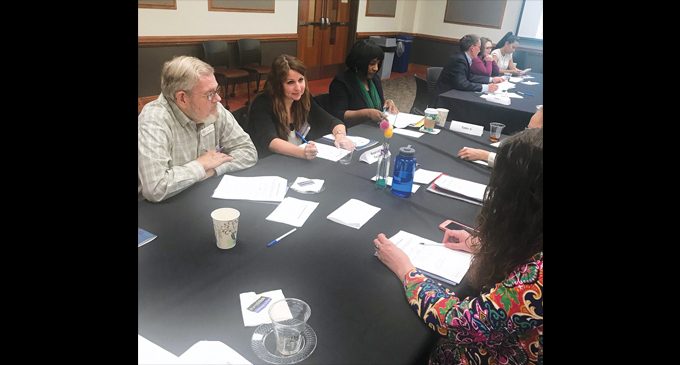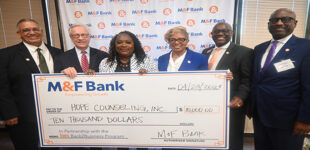Groups hold session on positive change in the county
Theresa Hoffman-Makar of Forsyth Futures facilitates a table conversation.

By Judie Holcomb-Pack
Age-Friendly Forsyth, Forsyth Futures, Imagine Forsyth and The Forsyth Promise hosted an evening to report on the collaborative progress they have made to bring about positive change in Forsyth County, as well as to gather input from attendees as to the challenges and opportunities for the future.
The event, held at the Strickland Center of Forsyth Technical Community College on Thursday, Dec. 6, attracted over 150 attendees, representing many of the agencies providing services to Forsyth County residents. According to the program, over 50 community partners are working together to “strengthen our systems of education, improve health and wellness outcomes, and support older adults as they age.”
Victor Isler, director of Forsyth County Department of Social Services, was the moderator and introduced several participants to give overviews of their results so far. Panelists were: Dr. Jewell Cherry, co-chair of Forsyth Promise; T. Lee Covington, immediate past chair of Age-Friendly Forsyth leadership team; Eric Aft, member of the leadership table for Imagine Forsyth; and Allan Younger, board vice chair of Forsyth Futures.
Younger noted that Forsyth Futures is accumulating data that is used to make better decisions as they work toward eliminating racial and socio-economic disparities. It uses the collected data to understand causes of challenges in Forsyth County and to communicate data in accessible ways to inform positive change.
Covington, the CEO of Senior Services, reported that in 2015 Forsyth County was ranked near the bottom in a report on age-friendly communities. Now, just three years later, Forsyth County is a designated Age-Friendly Community with six key areas of focus: physical and mental health, financial health, housing and safety, accessibility and mobility, support network, and empowerment and engagement. Covington reported on the process Senior Services used to gather data about the needs of seniors in Forsyth County. They began with a telephone survey of over 1,000 senior adults, and then conducted World Café events where seniors and those who served seniors had conversations to identify seniors’ needs and the status of age-friendly Forsyth. He noted that the initiative is self-funded, meaning that member organizations contribute to have “more skin in the game” beyond membership.
Isley facilitated a panel discussion about what the initiative needed to do in the future. Aft noted, “It’s working for some, but not for all. We need to make sure it’s working for most, if not all.”
After the panel discussions, facilitators at each table conducted conversations around two questions: How can we value community voice in a concrete, equitable way? As a community, what are our biggest obstacles and assets in approaching this work? Comments included the challenge of engaging the Hispanic community and not being inclusive, and the difficulty of reaching out to all the communities in Forsyth County as the ones outside of Winston-Salem are isolated. A common communication vehicle was also mentioned as a problem in reaching seniors in particular.
The report that Forbes magazine recently rated Winston-Salem as one of the 14 best places to travel in the U.S. in 2019 prompted the comment, “It’s a good time to be aging in Forsyth County.”
Don Martin, county commissioner, briefly attended the meeting, but no other elected officials were in attendance.















